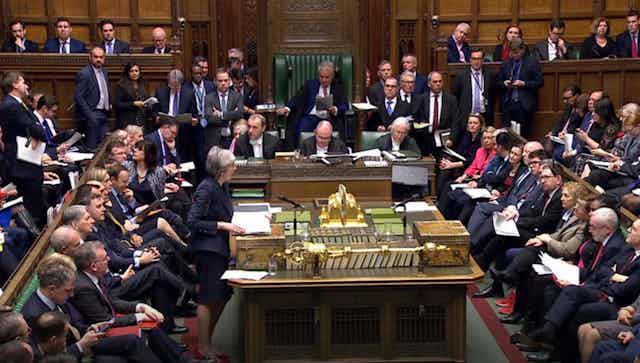Having succeeded in seizing control of parliamentary procedure, MPs have still not been able to reach an agreement on a preferred alternative to the government’s proposed withdrawal agreement.
As expected, no clear message emerged from the indicative votes held on the evening of March 27. Strong support in parliament for one alternative option had the potential to send a strong message to government, but instead it signalled that it still doesn’t have a clear idea about what it wants. However, progress has potentially been made. Some ideas – such as no deal – were firmly rejected. Others were less resoundingly defeated.
Alternative options on offer included revoking Article 50 to stop Brexit entirely and a series of different types of trade agreement with the EU. The closest thing to a winning idea was Conservative MP Ken Clarke’s proposal for a customs union with the EU. Some 264 MPs voted in favour, while 272 voted against. That majority of eight MPs against was the narrowest result of the night.
The second most popular option was holding a confirmatory referendum on Theresa May’s Brexit deal. This was backed by 268 MPs, with 295 voting against. Labour MPs were whipped to support it.
Despite their attempts to find a way forward, the lack of consensus within parliament at this point still suggests that leaving without a deal is more likely than it was. It will require a significant amount of effort from the prime minister to avert this.
The precise next steps have not yet been fully decided and they will depend heavily on the prime minister’s next move, but it seems that MPs will be asked to undertake a second series of indicative votes at the beginning of next week unless May successfully gets her deal through parliament before then. It would seem likely that they would be presented with a shorter list of options, made up of some of the better received options during the first round of indicative votes.
Next steps for government
If there is one potential glimmer of hope for the government, it is that the prime minister’s proposed withdrawal agreement may now have a slight chance of getting through parliament after she pledged to resign if MPs support her deal. This seems to have swayed some previous opponents. Even Boris Johnson has said that he will now reluctantly support May’s deal “on behalf of the 17.4m people who voted for Brexit”. The fact that as a result he will get the chance to run for the leadership, of course, has nothing to do with it.
But there are still around 20 or 30 hard Brexit supporters in May’s party who may refuse to support her deal and in a blow to the prime minister the DUP has said it will still not support it.
The governemnt’s next move will be to put the withdrawal deal to parliament once again. If this succeeds and it passes, then the Article 50 period will be extended to May 22 and the UK will be allowed to implement the necessary legislation and leave with the deal. If she honours her pledge, Theresa May will then stand down and a Conservative leadership battle will ensue.
If it fails to be ratified by parliament again, then the uncertainty and confusion remains. In such a scenario, May’s offer to resign no longer applies, although it is unlikely she would be able to remain in her position for much longer in such a situation anyway.
What Labour wants
It seems that support from other parties will be crucial for May if she is to get her deal through. However, that’s not to say it will be forthcoming. The way Labour MPs were whipped for the indicative votes suggest support from Labour is incredibly unlikely.
They were told not to support the options that would help May’s deal and to support the party’s proposal and Margaret Beckett’s suggestion of a second referendum, with Jeremy Corbyn writing to his MPs to tell them this was to “keep the option of a public vote on the table in order to stop a disastrous no deal or May’s unacceptable deal”.
But Labour must be careful not to put itself in a corner here, as if the deal or any assurances from the EU are altered to reflect the preferences for a softer Brexit, something Labour has supported, it may find it hard to keep opposing the withdrawal agreement without significant criticism.
Labour’s preference has always been a general election. There is some speculation that if the opposition were to take power in such a vote, it would not hold a referendum, instead opting to negotiate a better deal.
But this idea, much like many of the others being floated around parliament, are only possible if the EU is willing to reopen negotiations and seek a different way forward. At the moment, the EU has made it very clear that the UK can leave with the current deal on May 22, or with no deal at all on April 12. Whatever parliament can or cannot agree on, it will all be for nothing if the EU refuses to budge.

